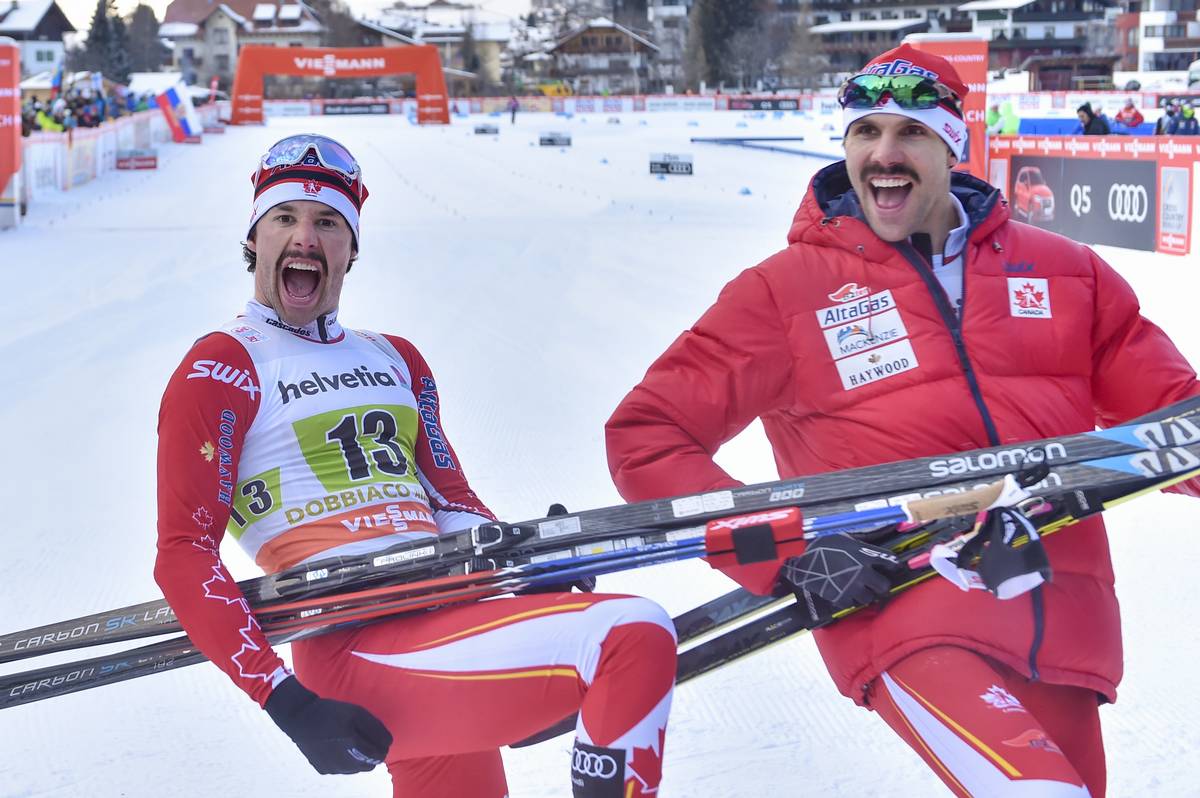
Canada’s Alex Harvey (l) and Len Valjas celebrate their World Cup freestyle team sprint win on Sunday in Toblach, Italy. It was the first team-sprint victory for Canada since 2011 World Championships. (Photo: Salomon/NordicFocus)
It’s been a year since the last World Cup freestyle team sprint. That event went down in Planica, Slovenia. Historically, the men’s skate team sprint has been a revolving door when it comes to the podium’s top step. According to the International Ski Federation (FIS), the last seven World Cup skate team sprints were won by seven different nations.
Add an eighth nation to that list: Canada.
On Sunday in Toblach, Italy, the Canadian duo of Alex Harvey and Len Valjas once again got an opportunity for some grandstanding air-guitar: a celebratory tradition it seems when the Canadians take the win. Harvey and Valjas won the 6 x 1.3-kilometer freestyle team sprint in 16:02.1 minutes. As the times back suggest, no team was able to pull away. Occasionally one nation shot off the front, trying to break the chain of drafting skiers, but that tactic proved fruitless. With Toblach’s undulating draft-friendly course, the chase pack would eventually glide up tight onto the skis of any athlete trying to make a break.
Here’s how the podium rounded out. Sweden I, comprised of Karl-Johan Westberg and Oskar Svensson, placed second (+0.53). Dietmar Nöckler and Federico Pellegrino of Italy I were third (+0.65).
As the times back to Harvey and Valjas suggest, it was a no-margin-for-error race; fourth through 11th place were separated by a little more than three seconds. So after five exchanges, where one skier tags the other for another two-lap 1.3 k leg, the U.S. team, with Simi Hamilton and Andy Newell, were in it: they finished sixth (+2.62).
Harvey + Valjas
Just one week ago, Harvey finished the Tour de Ski in seventh overall, a career best in the annual multi-stage event. And just days ago, Sunday’s win might have been off his radar.
“If you had asked me that two days ago, it’s surprising. I felt really good yesterday,” Harvey explained on the phone Sunday. “My qualification was my best qualification in two years.”
In Saturday’s individual skate sprint, he qualified eighth.
“I had a lot of speed, a lot of punch yesterday,” Harvey added. “Then I was like, ‘OK, maybe we can do something in the team sprint.’ ”
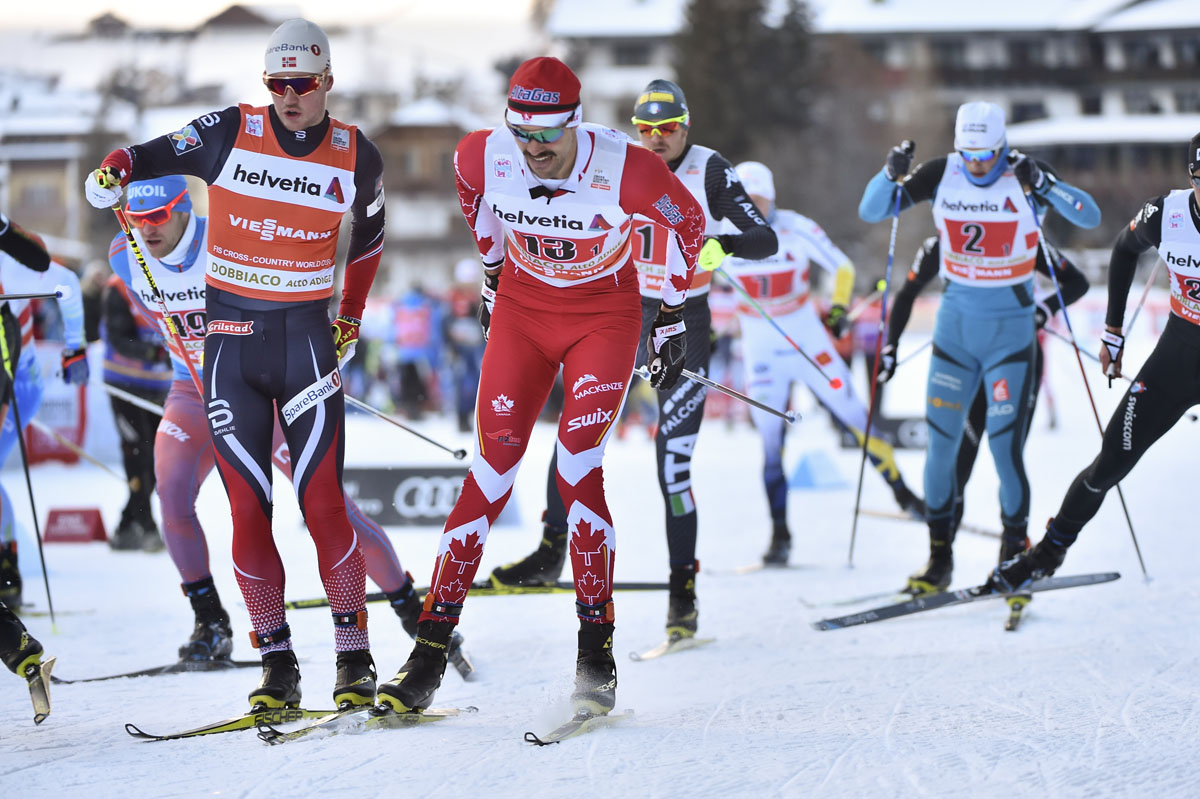
Canada’s Lenny Valjas (in red) en route to his first World Cup victory in the men’s freestyle team sprint in Toblach, Italy. (Photo: Fischer/NordicFocus)
Sunday’s win was the first World Cup victory for Valjas, Harvey’s teammate on the Canadian World Cup A-team. It was also the first win for Harvey and Valjas together in a team sprint. Harvey said the pair came into the day with little on-the-ground practice, but they had discussed their exchanges beforehand.
“We did not practice, actually, but we talked about it,” Harvey said. “Most of the time, after the pre-race meeting, it’s always the same; people say, ‘Don’t stress it. You can’t win the race with the exchange, but you can lose it, if it’s a bad one.’ So, we told each other, ‘Let’s not f- up, but if we can, let’s try and get position in the exchange.’ Like, why not? It’s part of the race.”
The Canadians executed their verbally mapped-out plan: they kept to the back and side of the exchange zone, and efficiently communicated when to accelerate once the tag was made.
“We made it clear what we wanted to do, and what we would say. Like, if I said your name and yell, ‘Go, go, go!’ that means you can go full gas, and I’ll still be able to touch you,” Harvey said of their exchange plan. “That’s half a second here, half a second there, and sometimes it’s two positions, and on a course that’s turny like this, two positions for free is a big difference.”
For Valjas, the victory marked his sixth-career podium on the World Cup. Four of those podiums, including Sunday’s win, came in sprints. His last podium came four years ago.
“This is unreal,” Valjas, 28, told the International Ski Federation (FIS) in a televised, post-race interview. “Honestly, we were hoping for a good result today, but I had no idea it was going to be this good.”
He described Sunday’s race as crowded. For this season, FIS expanded the team sprint finals from 10 to 15 teams.
“The final, there’s a lot of guys who go out,” Valjas explained on the phone. “[We] just kept ourselves out in the top half of the group in the top six or seven. Otherwise you just have so much traffic and it was on my last leg of my final, I got a little boxed in on the big climb, and I was making contact with people’s poles and skis and, instead of trying to make a move and potentially crashing, just doing everything I could to ski smart and to keep my skis off other people’s skis.”
That patience paid off. Other teams led throughout the race, including Sweden II, Norway II, Finland II, Norway I, and France I.
“The goal was to stay close to the front, but never in the lead because there was no point,” Harvey said of the team’s on-course strategy. “You could see the Norwegians on Lenny’s second leg in the final — the two guys gapped the field a little bit. But then it comes back in the downhill, and that surge, it takes it out of you because the recovery is so short in the team sprint, so it’s about positioning yourself in the best way possible while saving energy for the last lap.”
The fifth exchange, when Valjas tagged Harvey for the final leg, it was still early, but maybe time to tune the air guitars.
“I think it was around sixth place when I came around the corner … and out of the exchange. Alex had a great lane on the left, too,” Valjas recalled. He actually tagged off in eighth, but just 2.1 seconds out of first, it was close enough.
“[Alex] made a quick burst leaving the exchange and passed three guys right there and moved into a contending position,” Valjas said.
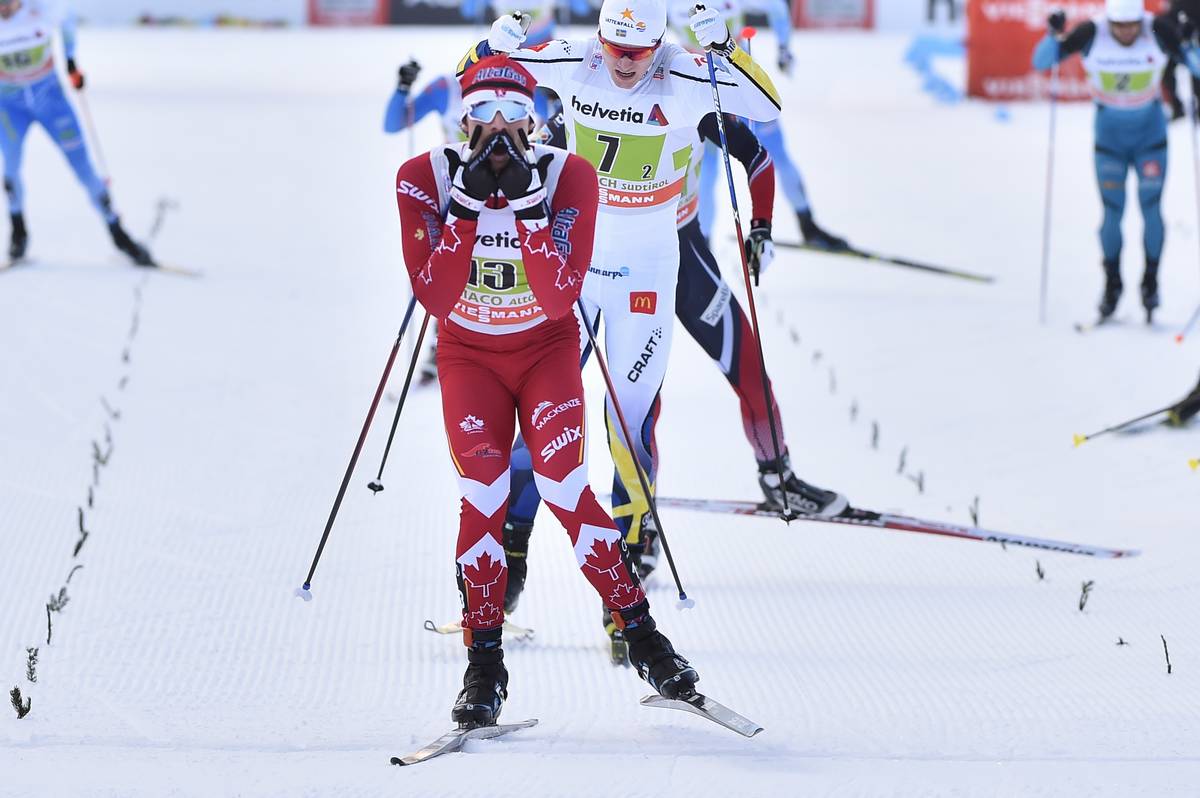
Respect the power of the mustache: Canadian Alex Harvey celebrates as he anchors his team to a World Cup freestyle team sprint win on Sunday in Toblach, Italy. (Photo: Salomon/NordicFocus)
Harvey was ready to capitalize. Having watched other nations take flyers off the front, he had reserves. Harvey skied the fastest final leg, moving into third at the base of the last climb then leading over the top. It was a risky move, staying in first from the final descent down into the stadium and all the way into the looping finishing stretch. Nobody on Sunday had won from that position before, having become victims of the draft, but Harvey didn’t let that stop him from leading.
“Look at those, look at those,” he said, pointing to his skis when FIS asked how he pulled off the win from that position. “The wax techs did a good job and we had good skis.”
While several teams scurried for the remaining spots on the podium behind him, the Canadian crossed the line looking relaxed and grooming his mustache for the cameras.
“I’m feeling good, but I had a really good teammate,” Harvey told FIS.
With 2017 World Championships beginning late next month, Harvey and Valjas are likely eyeing the classic team sprint there.
“Today was an amazing performance by those two, and I think it’s going to give them a really good boost for the world champs,” Canadian World Cup coach Ivan Babikov said from his home in Canmore, Alberta. “It’s a pretty stacked calendar [at World Championships] especially for Alex, who can be podium potential in every race. He wants to do everything, but sometimes you just have to be smart, and focus on the things he feels strongly about. Lot’s can change with the time, too. We’ll be looking forward to world champs, and try to plan it out perfectly, so enough energy through the whole World Championship.”
Hamilton, Newell in It Until the End
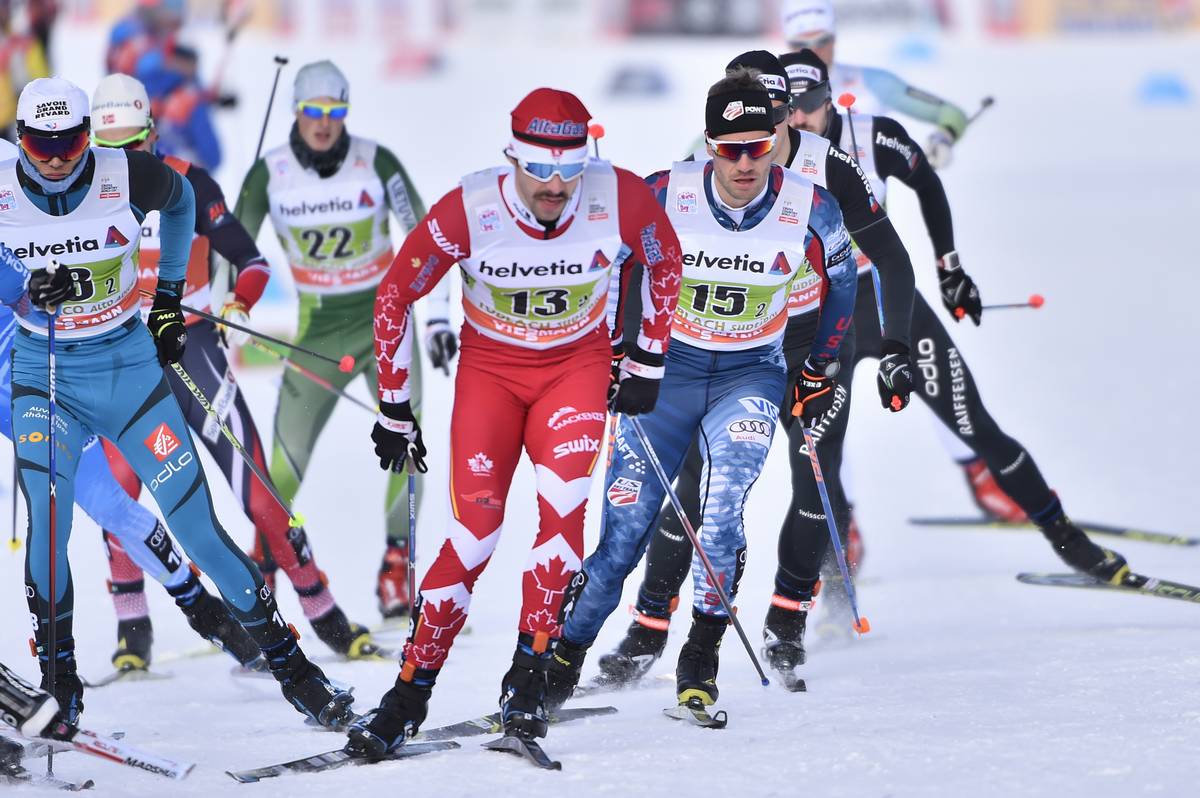
Canada’s Alex Harvey (13) leading American Simi Hamilton (15) among others in the men’s 6 x 1.3 k freestyle team sprint on Sunday at the World Cup in Toblach, Italy. (Photo: Salomon/NordicFocus)
For the U.S. men’s team, Sunday was also a day to unkink and de-rust the team sprint tactics and techniques. Hamilton and Newell combined for fifth in their semifinal, one place behind Valjas and Harvey in fourth in that heat.
Hamilton was coming off a second-place finish in Saturday’s skate sprint. He explained his initial sensations for the day were bland, as he spent over three hours after Saturday’s sprint navigating doping control in a cold, restricted area, absent equipment for a proper warmdown.
Despite feeling sharp in the semifinal, Newell crashed just before the tag zone for the first exchange in the final.
“It was unfortunate that I took an early, hard crash right before the tag zone on my first [leg],” Newell said on the phone. “I was kind of spun like a top and landed right on my butt. I was able to get up pretty fast, and sprint towards the tag zone, but we were still in last.”
Also on that first leg, Newell received a yellow card for obstruction. He explained that he stepped on another racer’s ski on a downhill section of course. The infraction did not cause a crash, but it did give Newell a written reprimand. Accumulating two yellow cards in a season leads to a disqualification (although, according to the FIS rulebook, “Written reprimands given during the season are not valid in the WSC [World Ski Championships] and OWG [Olympic Winter Games] periods. Written reprimands given during WSC or OWG are valid until the end of the season.”)
After that initial tag, Hamilton gunned it. He skied the fastest second leg, keeping the team from losing ground. Newell and Hamilton kept in the hunt, conserving energy, maybe losing a spot here, then gaining two there. Hamilton tagged Newell in 12th.
“My right glute took a hard hit, and it wasn’t a super-easy course to pass on either, so I think we spent some energy trying to get around people, but even still, we were right in it by the last lap,” Newell said.
Despite the spill or less-than-perfect exchanges, the U.S. was never out of it. Hamilton brought them into ninth and 4.2 seconds out of first after the fourth of six legs, and Newell slipped back slightly to 11th, just 4.5 seconds back. Finally, Hamilton’s second-fastest final leg time put them in sixth at the finish.
“We are both quick on our feet and we’re adaptable and we figure things out like that pretty quickly, but I think, for sure, we will spend some time just working on our tags to make them a little more crisp,” Hamilton said on the phone. “At the same time, you can’t dial in just one way you are planning on doing things in the future because things are constantly changing. You never know if the race is going to be at a pretty ‘pedestrian’ pace off the bat and you might be tagging in the very front of the pack, or if it is a really hot pace, you might be closer to the back. You just have to change things on the fly a little bit. I think that is something that we are both really good at, just being able to adapt to kind of a changing environment.”
The shifting nature of this race, when most teams at one point either seemed way out of it or right in it, was the type of changing environment Hamilton referred to.
The next team sprint prior to World Championships will take place Feb. 5 at the World Cup in PyeongChang, South Korea. Hamilton and Newell plan on contesting that event.
Russia’s Matveeva 2-2 in Toblach; U.S. Women 10th
On the women’s side, race organizers were most likely thankful for modern technology: after the teams of two raced their shares of the 6 x 1.3 k team-sprint pie, a hypersensitive camera was needed to determine the winner. It was a three-way photo finish.
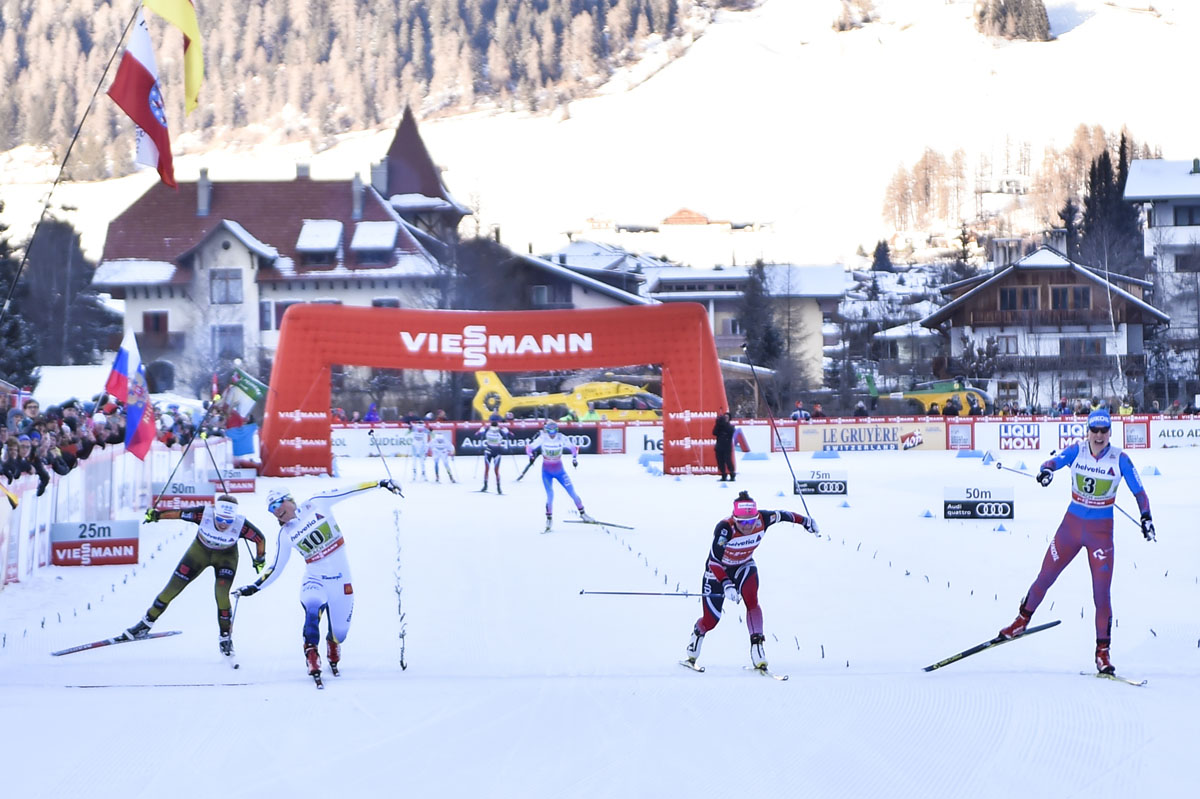
Russia’s Natalia Matveeva (r) winning a three-way photo finish for first in the women’s freestyle team sprint on Sunday in Toblach, Italy, ahead of Sweden’s Hanna Falk (second from l, in white), who placed second (+0.04), and Norway’s Maiken Caspersen Falla (second from r), who ended up third (+0.11), respectively. Germany’s Sandra Ringwald (l) finished fourth. (Photo: Fischer/NordicFocus)
Team Russia I’s Yulia Belorukova and Natalia Matveeva won in a time of 18:00.96, after Matveeva repeated her tactics from Saturday’s individual sprint to come from behind in the finishing stretch.
Just like on Saturday, she followed Norway’s Maiken Caspersen Falla up the last climb and trailed her closely on the descent. Between them on Sunday, Sweden’s Hanna Falk drafted Falla while skiing in second on the downhill, then went wide on the curve to challenge her over the last 100 meters. Matveeva took the inside line around the turn and snuck up on the other side of Falla. Upon close review, the final results revealed that Matveeva captured the win — her second in two days — by 0.04 seconds over Falk in second, and Falla settled for third (+0.11).
“Today I was definitely not world-class level,” a disappointed Falla said, according to a FIS press release. “I have a strong competitive instinct so this loss really irritates me.”
For Matveeva, it was the beginning of a winning streak, and for her teammate Belorukova, a U23 skier, it was her first World Cup podium.
“It was an amazing weekend in Toblach,” the 30-year-old Matveeva said, according to FIS. “To leave with two wins is great. Yulia did a great job in her leg, and I had a lot of confidence from yesterday I could be again fast on the home stretch. To win with my teammate is really special.”
Falk teamed up with Ida Ingemarsdotter for Sweden I, while Falla combined with Astrid Uhrenholdt Jacobsen for third.
“It was a good day at work,” Ingemarsdotter said, according to FIS. “We raced well and this was a big step in the right direction for the upcoming competitions.”
Canada did not enter a women’s team, and the U.S. team of Sophie Caldwell and Kikkan Randall placed 10th (+20.63).
In an email, U.S. skier Caldwell mentioned it was a grind.
“While I always love the opportunity to do a team event, I think I was running on fumes today,” Caldwell wrote. “The semifinal went well, but I didn’t have too much left in me for the final, so was bleeding some time on pretty much all parts of the course.”
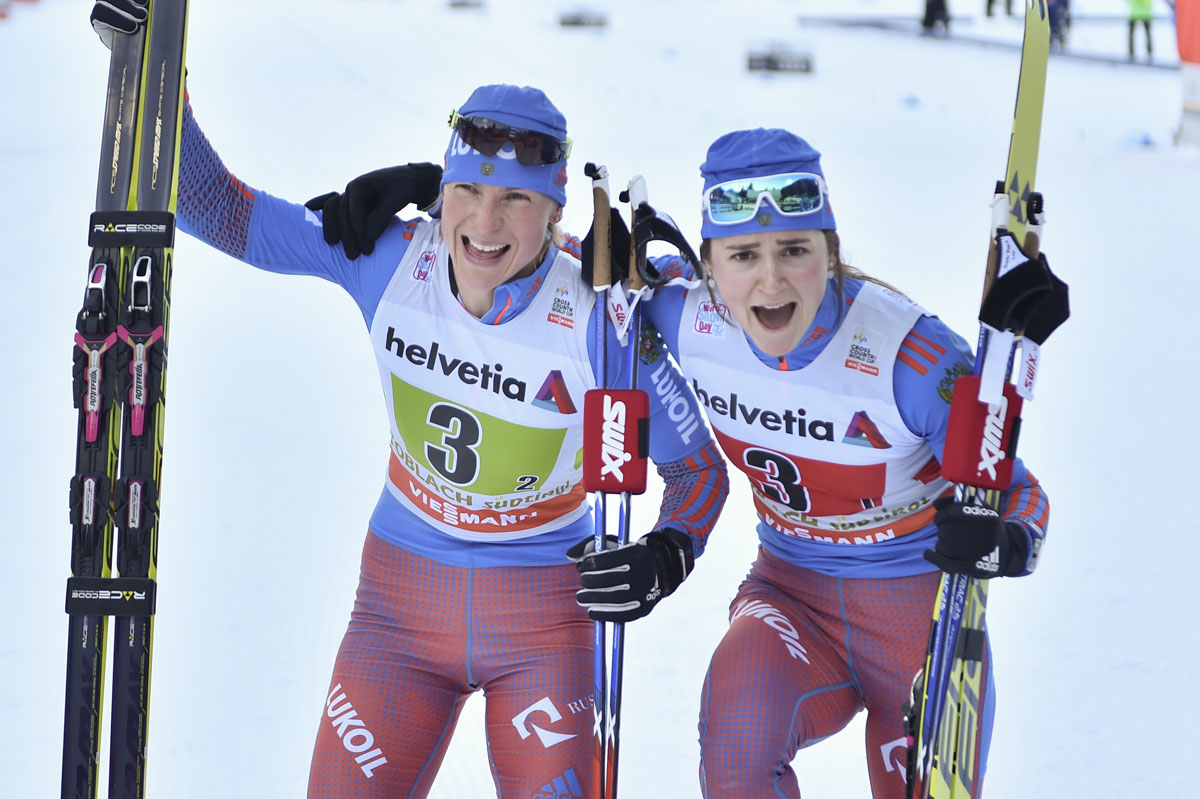
Russia’s Natalia Matveeva (l) and Yulia Belorukova celebrating Belorukova’s first World Cup victory and Matveeva’s second-straight win after Sunday’s freestyle team sprint in Toblach, Italy. (Photo: Fischer/NordicFocus)
According to the email, Caldwell went to the hospital last Monday with a “stomach bug”.
“I’m looking forward to getting in some solid training and focusing on eating back the energy I lost earlier this week from being sick. It’s a bummer to have a bad race, especially in a team event, but all I can do is look ahead and try to put this one behind me,” she wrote.
Caldwell placed 11th in Saturday’s sprint, following Randall in 10th.
In their semifinal, the duo raced to third to secure a spot in the final.
“With 15 teams in the final it was pretty busy those first few laps,” Randall wrote in an email. “I just tried to stay relaxed in the pack on my first round. On the second round I tried to move up but it was really hard to find space to get around. I was always able to make up a few places coming off the last turn before the tag zone. But the tag zone was always really chaotic. Matveeva almost took Sophie out on the 2nd tag.”
On her second leg, Randall skied the fastest split and was a handful of seconds back from the lead as she tagged Caldwell.
“We were still right with the lead group going into Sophie’s last lap,” Randall wrote. “Sophie laid it out there up the first climb, but I think the effort caught up with her and we lost touch with the leaders before the last tag. I was able to chase a few teams down to get us into the top 10.”
Like others, Randall is eyeing the World Championships team sprint.
“World Championships this year will be classic so it could play out a little differently than today,” Randall wrote when asked what the U.S. will be looking to improve on in the team sprint. “We just need more durability so we can stay in the fight all the way until the last round and then I think we have several finishers on this team that could be in the hunt for a podium.”
Results: Men | Women
— Ian Tovell, Jake Ellis and Alex Kochon contributed
The post Bringing Back the Air Guitar, Harvey & Valjas Win Toblach Team Sprint appeared first on FasterSkier.com.